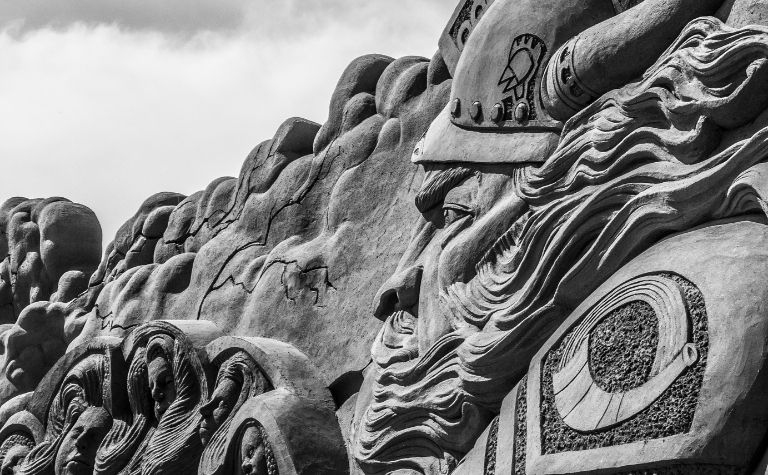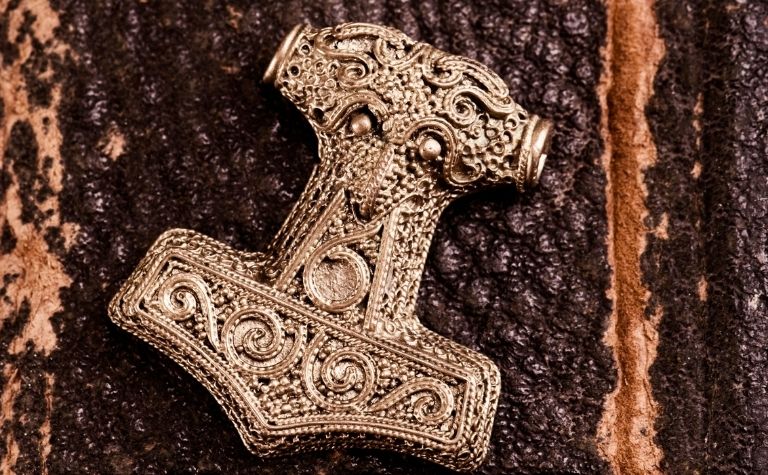Despite what the hit video game series God of War suggests, the Vikings didn’t worship one single war god. Several members of the Norse pantheon are gods of war.
The Vikings even prayed to gods like Thor for protection and strength, but he wasn’t a god of war.
In Norse Mythology, the gods of war are Odin, Tyr, and Freya.
Myths exist of the Valkyries, female warrior spirits chosen by Odin to select the courageous fallen warriors and guide them to Valhalla in the afterlife.
Though Odin is sometimes called “the” Norse god of war, he’s “a” Norse god of war.
Tyr presides over war, law, and justice, and the goddess Freya rules over sex, love, and fertility, as well as war.
The Valkyries aren’t war goddesses themselves, but they’re spirits who serve Odin. Read on to find out more about the Norse gods of war.
Also, see Are Norse Gods Good or Evil? to learn more.

Who Is Odin in Norse Mythology?
Odin leads the Aesir gods, the main tribe of deities the Vikings worshipped. The Aesir are contrasted with the Vanir gods, though modern scholars know very little about the Vanir.
Odin is incredibly wise, skilled in magic and divination, and the patron of rulers, warriors, outlaws, and poets.
Odin is the Allfather, the god of sovereignty, war, poetry, wisdom, magic, and the dead. He isn’t a warrior himself, but his wisdom and foresight often determine who lives and dies in battle.
In addition to being the figurative father of the gods, Odin sires many gods and goddesses. He’s the father of Thor, Balder, Hoder, Vidar, and Vali.
Thor and Odin tend to conflict with one another because Thor is a god of the common people, while Odin prefers nobility.
Odin’s brand of sovereignty isn’t born out of respect for the law, unlike Tyr, the god of justice.
Instead, Odin favors cunning rulers, leaders who seek knowledge over fairness. He’s not a just and loving ruler, but Odin is essential to the cosmos’ ancient Norse conception.
Also, see Does Norse Mythology Have a Bible? to learn more.
What Is Odin Known For?
Odin is known for his wisdom, skill with words, magical abilities, and power to understand and use the sacred runes.
Physically, he’s notable for having one eye, a long beard, a wide-brimmed hat, and a cloak.
The disembodied head of Mímir grants Odin wisdom at the price of one of his eyes. However, in some stories, Odin drinks from Mímir’s well instead, though the price remains the same.
He’s often followed by two ravens, Huginn and Muninn, who gather information and report back to him.
Despite being a war god, Odin doesn’t participate in many fights, but when he does, he wields the spear Gungnir.
He also commands the Valkyries, female warrior spirits who escort noble soldiers to Valhalla when they die in battle.
In some stories, the Valkyries themselves choose who lives and dies in war.

What Is Ragnarok in Norse Mythology?
Between Marvel’s Thor movies and Sony’s God of War series, Ragnarok is almost as much a piece of pop culture as Thor, Odin, and Loki. But Ragnarok in myth isn’t the same as Ragnarok in movies and games.
In Norse Mythology, Ragnarok is the death of the gods and, in some stories, the end of all things.
Though it has yet to happen, the events have been predicted in great detail. All but a few gods will die, and in most versions, two humans will live to repopulate the earth.
Ragnarok will begin with a terrible winter that forces humanity into famine and warfare.
Jormungandr, the massive serpent who encircles Earth, will release his tail from his mouth and wreak havoc on the planet. The gods will rise to fight monsters and giants, even though they know that they’ll die.
Odin will die in Ragnarok when he fights Fenrir, the giant wolf son of Loki. Fenrir will swallow Odin whole, and Odin’s son Vidar will avenge him.
Almost all the Norse gods and their foes will die in Ragnarok, while only a few of their children survive. In some versions of the myth, these survivors will rebuild all of creation from the destruction.
In other stories, Ragnarok is the end of everything.
Also, see Is the Kraken Greek or Norse Mythology? to learn more.
Who Are the Other Gods of War in Norse Mythology?
Tyr and Freya are the other gods of war in Norse Mythology besides Odin. Tyr is the one-handed god of war, law, and justice, while Freya, the Vanir goddess of fertility, is known for beauty, love, and war.
Tyr, the One-Handed God of War
Tyr is most famous for his encounter with Fenrir, the giant wolf predicted to kill Odin.
The gods try to restrain a young Fenrir, fearing his power, but the beast breaks free from his bindings again and again.
The gods finally succeed at chaining Fenrir with a magical cord made by dwarves.
But Fenrir refuses to wear the cord unless someone places a hand in his mouth as a sign of good faith that they’ll remove the cord if he can’t break it.
Tyr volunteers his hand. Fenrir struggles against the magic bindings and bites off Tyr’s right hand, but the wolf is chained until Ragnarok. None of the other gods, except Tyr, are willing to make this sacrifice.
Freya
Freya’s primary role in Norse mythology is as a goddess of sex, love, beauty, and fertility. In addition to these roles, she is important to warriors.
Odin isn’t the only Norse god with a special realm in the afterlife. Freya rules over Folkvangr, and she handpicks half of the warriors slain in battle to spend eternity with her.
The other half goes to Valhalla with Odin, escorted by the Valkyries.
Freya’s role as a war goddess and her hall in the afterlife suggests a deep connection between her and Odin. Freya’s husband is named Odr, and Odin’s wife is named Frigg.
It’s theorized that these two couples used to be one–Odin and Odr, Freya and Frigg–but split into distinct gods for an unknown reason.
Freya as a war goddess makes much more sense if she’s Odin’s wife, given his importance as a war god.
Unfortunately, little evidence of this connection has survived to the present day, and scholars are left only with speculation.
Is Thor a War God?
Whether or not Thor is a war god is debatable. The National Museum of Denmark suggests that Thor is a god of war and fertility (like Freya), but few other sources call him a “god of war.”
Thor may not be a war god, but he’s a warrior god. As Asgard’s most fierce protector, he’s a great fighter, and Viking warriors appealed to him for strength and courage.
Odin isn’t a fighter and participates in unmasculine hobbies such as poetry, but Thor is an ideal warrior for Vikings to emulate.
He’s best known for fighting off giants, who symbolize chaos, with his mighty hammer. Thor is brave, dutiful, tireless, and strong–all attributes that warriors desire.
Conclusion
The Norse pantheon is a complicated, interconnected belief system. Many gods are connected to war and the glory that awaits those who die in battle.
